Student Blog
Classes
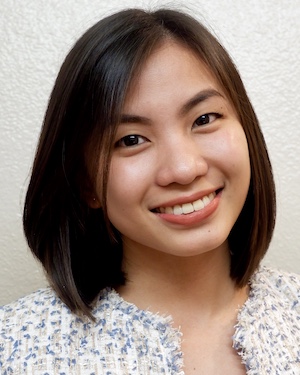
Dear MA1 Students, ⟩
February 25, 2021, by Yna
Classes Diversity Getting Involved International Life Hacks
How we were able to create an environment filled with nothing but love and support for each other with the challenges of distant learning is something that I don’t know but I sure am thankful of. It is truly amazing to think about it: how a lot of us haven’t even met each other in person — with some of us even having classes from across the globe — and yet, we are able to touch each other’s lives and share this journey together through shared Spotify playlists, after-class study sessions over Zoom, little fun facts about us that we share with each other, random comments over private chat, or even that simple “we got this, guys!” really goes a long way. Every once in a while, we find pleasant surprises from our little interactions with each other that gradually connect us altogether and make our experience nothing short of amazing. Today, here’s a surprise that would hopefully help you get through stressful times 😊
- “Dear MA1 Students — I was asked to provide some words of motivation for you, but I would like to THANK YOU for motivating and inspiring me! I’m so impressed by the perseverance, creativity, and determination that you have demonstrated as post-professional master’s students. You have accomplished so much already, and I’m confident you will continue to succeed both in the master’s program and beyond. Remember to take some time to celebrate your achievements and use that as motivation to continue the hard work on your journey.”
— Dr. Emily Ochi - “When I was a graduate student, I found this quote that spoke to me and where I was at, at that time . . . in the midst of late-night study sessions, in-between messy relationships, or wrestling with self-doubt. The quote said:
“Today my anthro professor said something kind of beautiful:
‘You all have a little bit of ‘I want to save the world’ in you, that’s why you’re here, in college. I want you to know that it’s okay if you only save one person, and it’s okay if that person is you.’” I share this quote to give you permission (if you needed it today) to remember to take care of yourself at this time. Of course, we have big dreams for you and I deeply believe in this cohort. Each one of you are incredibly hard workers and I always appreciate the perspectives you bring to class, the work you put into being present (on a screen none-the-less!), and the ways you share your understandings of the class content . . . But! I will not encourage you to compromise yourself, in order to “save the world”. Let’s get rid of that notion. You matter, and let’s start there. So please take time for yourself, especially in the middle of the semester like we find ourselves in now, and let us know if or when you need support or just extra kindness that day. You are doing an extraordinary thing, having the bravery to study in a new place and challenging yourself with multiple courses. That is more than enough, and I hope this message finds you on a day where you are believing that you are more than enough too. “Again, we believe in you and are behind you today!”
— Dr. Kelcie Kadowaki - “HI MA1! I know graduate school can be overwhelming but remember, you know more than you think you know and you are exactly where you are supposed to be at this moment in time. Give yourselves a pat on the back for all the hard work you are putting into your growth. Enjoy the process. Lean on each other for support. Be confident. Take a break and of course, stay safe. 😊”
— Macy Peralta - “Dear MA 1 students — It has been such an honor to be your instructor this semester. I look forward to our class because I can sense your intrinsic interest in the material and the ways that you support one another. I love hearing your perspectives as we read qualitative research together! Karin Saric, our librarian, was also very impressed by your thoughtful questions and skillful database searching.
I have been deeply impressed with your resilience, your ability to not only adapt to the remote learning environment but also thrive in this environment. When you had challenges with google drive, you viewed it as an opportunity to learn and grow. 😊 I love that. I hope I can embody this same resilience and adaptability in my own life as well. Thank you for being a part of this class as we learn and grow together.”
— Dr. Tessa Milman - “Do not underestimate a deep breath of fresh air from a place of serenity like from under your favorite tree or feeling the sense of comfort from having a warm bowl of your favorite soup. These kinds of simple activities, when feeling under a lot pressure can allow space for our minds to take a break and maybe even a chance to reinstate a positive attitude. Remember, sí se puede and that your Chan faculty believe in you!”
— Dr. Celso Delgado - “Life often gets overwhelming with so many things to do and so many situations out of our control - especially this year! When I get overwhelmed, I sometimes find it helpful to pause, take some deep breaths, and think about a few things I am grateful for and try to think of a things that I can control, even if it’s something as small as what to eat for dinner or watch on Netflix. And then, when I feel overwhelmed again, even if it’s just 5 minutes later, I try not to just acknowledge that sometimes, situations really are overwhelming! (And, around this time in spring semester is usually one of those times, pandemic or not!). As your professors, we want you to know that we are so proud of each one of you for taking the big step of being in this program, engaging and showing up for your classes, and doing your best during this hard time so that you can ultimate be the best OTs and help others as much as possible. We hope you take time to take care of yourselves, and hang in there — it will get better. 😊”
— Dr. Sook-Lei Liew - “Sometimes, it helps to remember that in the end, we write our own stories. We can be crushed by some unfairness or a failure, or consider these to be the building blocks for future success, as opportunities to overcome, grow, and inspire others. And if it is our reactions to our circumstances that define us, then any circumstance met with optimism, gratitude, and humility becomes a success story. We are living through a time when our lives and occupations are especially disrupted. Maybe this trial by fire could be what forges you into a uniquely exceptional generation of OTs, and one that is looked up to well into the future!”
— Dr. Christopher Laine - “I have not failed. I’ve just found 10,000 ways that won’t work.” — Thomas Edison; “The expert in anything was once a beginner.” — Helen Hayes; “You don’t always get what you wish for, you get what you work for.” — Anonymous; “Some people dream of great accomplishments, while others stay awake and do them.” — Anonymous
— Dr. Sharon Cermak - “You’ve all worked so hard to get to this point! Think of all the steps you took to get to this program, including for some of you moving to a whole new country! Keep up the great work and when the road ahead looks difficult, don’t forget to look back and marvel at the road traveled to get here!”
— Ty Kim
While these quotes are directed to MA1 students, I’m sure anyone who find themselves in need of a little bit of motivation could use these too. I hope you enjoyed, and as always, Fight On!
⋯
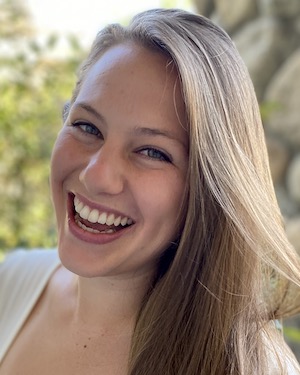
Why I Chose to Attend USC ⟩
February 17, 2021, by Savi
Admissions Classes Fieldwork Getting Involved Living in LA
During the past few weeks, a plethora of admitted and prospective students have reached out to get a student’s perspective on why we chose to complete our Master’s degree at USC. This simple question has made me reflect on all the wonderful reasons I have enjoyed my time in the program. I have decided to create a list of the reasons I chose to complete my Master’s degree at USC below. I hope this list helps admitted students reading with your decision during this overwhelming and exciting time! This list can also be a great resource for students deciding whether or not to apply to this program in the coming years.
- The USC community and connections: Going to USC immediately connects you to a very large group of OTs around the world. With around 130 OT students graduating from the Master’s program each year, the quantity of USC OT alumni is exuberant. This allows current USC students the opportunity to have resources and connections both within and outside the division. Whether you are looking to find a job after graduating or get advice about your career path, you have an extremely high chance of finding USC alumni in your field of choice. This can be really helpful since OTs can work in such a wide range of practice settings and it can get tricky deciding what path may be right for you. During your various fieldwork placements, you are also bound to run into or be mentored by USC alumni and it is great to make those connections with other trojans who understand the curriculum, program structure, etc.
- The faculty and resources: As a student, you get the opportunity to learn from some of the most amazing and world-renowned OTs. All of the faculty members have dedicated their lives to OT through clinical work, teaching, and research. These clinicians, researchers, and educators all have an open door policy and capitalize on any opportunity to chat with and get to know students. You can go to them for casual conversation, assistance with schoolwork, guidance in life and your career, and more. This team, along with all of the outstanding cutting-edge research being conducted within our division, gives us the unique opportunity to be some of the first to learn about the most up-and-coming techniques and discoveries. This environment encourages every student to challenge themselves, work hard, and become a leader in the OT field.
- The students: As mentioned before, USC admits around 130 students into their Master’s program. This larger class size has given me the opportunity to meet a plethora of different learners and future practitioners. After spending the first summer semester learning from all of these different perspectives in a larger class setting, everyone is split up into three different cohorts of about 40-50 students. The cohorts are small so you get to know everyone really well, but you also get the chance to socialize with the larger group of around 130 students outside of the classroom to learn about their experience in different practice immersions before you take them. The cohorts are further split into 2 groups to make lectures and labs even smaller. The two groups will switch off the order in which they attend lectures and labs, which allows for more individualized attention from the professors during class.
- Hands-on work: USC integrates fieldwork into each semester. As an extremely hands-on learner, I was really excited to discover that USC allows students to work at a fieldwork I site once a week during each practice immersion semester. We, therefore, get the chance to go into class three times a week and then apply what we learn in real-time with clients. We can come back each week and debrief with each other and our professors. By doing so, I didn’t feel like I was just a student sitting in class trying to absorb information. I really got the chance to take that knowledge and apply it every week. On top of that, we also are provided with the typical fieldwork II experience, in which we work as full-time OTs for 12-weeks during each summer in a setting of your choice. We have connections with over 950 fieldwork sites across the globe, so the opportunities to work in any field of your choice before graduating are endless. Students also have access to Keck Hospital of USC and USC Norris Cancer Hospital Occupational Therapy and the Faculty Practice, which is the birthplace of Lifestyle Redesign®. Students, therefore, have the opportunity to be mentored in a number of existing and developing practice areas at the outstanding USC hospitals and at the Faculty Practice in order to gain clinical experiences during their program of study.
- Los Angeles: Los Angeles is a city with endless OT opportunities. Whatever you may be passionate about in the OT realm . . . you can find it in LA. Outside of OT opportunities, LA is an amazing place to live. Anything you want to do, see, or eat is in this city. You can go hiking in the morning, sit on the beach in the afternoon, and grab a bite to eat in downtown all in one day! Comedy shows, outdoor adventures, etc. It is ALL here.
⋯
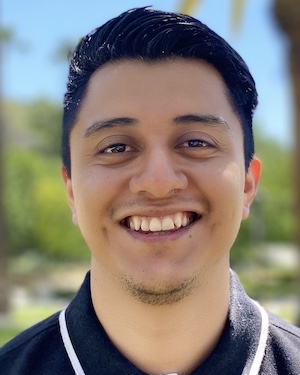
Electives During the OTD Program ⟩
February 5, 2021, by Daniel
Classes
This Fall I was feeling burnt out towards the end of the semester. It was my first OTD semester with classes being virtual and it was my first time being the only OT at my site (primary care clinic). Many times, I was just trying to keep up with my assignments and residency demands. During the month of October, I began looking at what classes I would be taking for the Spring semester, but it was all just too stressful, and I kept pushing it back. My bi-weekly check ins with my faculty mentor and clinical preceptor helped with brainstorming ideas for potential electives to take in the Spring. The idea of getting to choose courses that interest me and plan my own schedule sounded refreshing. I began to look for electives outside of the OT department since I’ve never had the opportunity to take a class in another department.
Taking the advice from my check ins and further understanding the needs of my residency population, I decided to look for electives in gerontology, policy, and pain medicine under the Keck School of Medicine. Eventually, I came across several exciting opportunities to take as electives but not enough units because of the 2 additional elective units I took during the Master’s program. Remember that during the OTD program you can take 4 units of electives (unless you took extra elective units as a USC Master’s student). For students starting their OTD in the fall, in the Spring semester you will also be taking OT 621: Occupational Therapy Leadership: Contemporary Issues (4 units).
Since the beginning of my residency training our focus has been supporting clients with uncontrolled diabetes and hypertension. I also had the opportunity to provide short consultations, with one of the highest requests being for chronic pain. Clients on our active caseload will often request support with pain management as well due to diabetes complications such as neuropathy and other comorbidities that cause pain, making it harder for them to engage in their health management and daily occupations. Given this need and while doing further research, I decided I wanted to use my 2 elective units to learn more about pain and better support my clients. After reaching out to Keck faculty to get clearance for pain medicine courses, I enrolled in PAIN-704: Pain and Society: Epidemiology and Cultural Issues and PAIN-720: Physical and Occupational Therapies. PAIN 704 is a course focused on exploring societal issues related to pain and pain management such as culture, ethnicity, caregiving, social and psychological factors. PAIN 720 is a course focused on discussing different OT and PT techniques to assess and treat chronic pain.
The first week of January I had a check-in with Dr. Sarah Bream, our OTD Program Director. During our meeting I shared with her my desire to take MDED-511: Immigrants, Illness, and Narrative Medicine (4 units), but not having enough units. MDED 511 is a course that examines immigrant experiences in the U.S. through the lens of narrative medicine, aimed to deepen students’ understanding of critical issues affecting immigrants in the U.S. and develop skills to better serve immigrant communities and populations in healthcare and other social services. I shared with her my passion to increase my knowledge and skills to better serve immigrant communities during my residency and in my career. Dr. Bream was very receptive of my ideas and even provided additional advice to work on for my OTD portfolio. She shared with me that on a case-to-case basis, exceptions could be made to substitute OT 621 with another course. I was really surprised but excited to hear this because that meant I could take the MDED 511 course. I truly appreciated her help with problem solving, finding a way to shape my OTD experience, and taking care of the necessary paperwork to make the change.
I am now three weeks into my Spring semester, and I am feeling refreshed (after Winter Break), more confident in my clinical skills, and looking forward to my electives expanding my knowledge. I wanted to share my experience choosing electives during the OTD because if you are feeling unsure about what to take or simply don’t have enough units to take certain courses, I encourage you to reach out to Dr. Bream, your faculty mentor, classmates, the student ambassadors, or even former students because unless you ask, you may not know about the different ways that you can customize your learning experience.
⋯

Advice for Incoming Occupational Therapy Students ⟩
January 21, 2021, by Savi
Classes Fieldwork Getting Involved Life Hacks
Before beginning my journey as a student in the Entry-Level Master’s program, I remember being extremely overwhelmed. I, therefore, wanted to dedicate this blog to giving incoming students some advice I wish I would’ve known. To those who will be receiving their acceptance letters soon . . . congratulations on this huge achievement! I hope you keep these pieces of advice with you throughout your time at USC.
- A’s aren’t everything. Although it may be ingrained in you that grades are what measure your level of success, you must now focus more on the learning process instead of the grade outcome. The deciding factor for whether you will get hired over another candidate is your ability to be personable, your experience in the field, and the skills you are equipped with. You made it here, so now you can breathe and just focus on passing and learning all that you can! I speak more about this in my blog An A+ Doesn’t Define You, so be sure to visit this blog for more information.
- Lean on your classmates. This master’s program is not a competition so do not try to make it one. Your fellow classmates are most likely struggling with the same or similar things as you, so reach out to them and be honest. You will find that developing a study group can be VERY beneficial for your mental wellbeing as well as your ability to retain information. By saying things out loud, explaining a concept to a classmate, or hearing your classmate explain a concept to you in their own words, you will find yourself memorizing everything you need or want to know without having to study alone. This is also good practice for the clinical setting as you will be required to work with a variety of colleagues who have different strengths and weaknesses than your own. You can learn how to not only work together but also uplift each other. Build that foundation of support so that studying becomes easier and your coursework has more meaning.
- Take all the time you need to decide what organizations you want to join. Time is valuable in this program and you must make the most of it. Although it may be tempting, try not to join every single organization that you may be slightly interested in. Take your time learning about each opportunity and commit yourself to one or two. Throughout your two years, a variety of opportunities will arise for you to take advantage of. For example, becoming an ambassador was an opportunity that presented itself at the end of my first year in the master’s program. You want to give yourself enough time to fully engage in the organizations you choose to join, while also leaving time for future opportunities that may become available later on. Pick things because you are passionate about them not because they will look good on a resume. To learn more about the student organization options check out my blog What Student Organization Should I Join?
- Get to know your professors. The faculty members in the Chan Division are unbelievable. Each professor or instructor you will have is passionate about a different topic. Learn and ask about their passions and their experience pursuing OT in their field of choice. Most of their journeys were not straightforward and many may surprise you. This is an incredible opportunity to learn from some of the most distinguished OTs in the world . . . so take advantage of it. Ask them questions both inside and outside of the classroom and build relationships with them. These professors can and will be your mentors for the rest of your life.
- Be open to any opportunity that may come your way. During your fieldwork I clinical experiences, you will get the chance to practice OT once a week in three different settings (mental health, pediatrics, and adult rehabilitation) throughout your two years in the master’s program. You will also have the chance to choose two of these settings to focus on for 12 weeks as a full-time fieldwork II student each summer. Although one or two of these settings may not be ones that you are extremely passionate about, you must take advantage of the learning opportunities you are given by the fieldwork team. Maybe the fieldwork placement will teach you how to deal with conflict, become an independent practitioner, listen more intently, or stay organized. You may even surprise yourself and fall in love with a practice setting you never expected to enjoy! Whether or not you can see yourself as a practicing OT in this setting, make sure to walk into each placement with an open mind and your best foot forward. If you do not do so, then you will not only waste your time but also the time and resources of the clinical setting that has allowed you to come and work with their patients. Instead, use these opportunities to build relationships with the practitioners around you and harness the skills needed to be successful in your future dream job.
- Schedule in time for revitalizing occupations. Whether these occupations are as exciting as going to the beach, hanging out with friends, or skateboarding, or as “simple” as showering and sleeping, be sure to find time for what makes you feel happy and more like yourself. You will not be able to succeed in this program unless you take care of yourself because you will quickly lose steam (take it from the girl who worked two jobs and barely slept for two semesters in a row). Your grades will begin to suffer but more importantly, your ability to retain important and valuable information, be present in class, and maintain your mental and physical health will most likely begin to deteriorate. If that means that you have to block off time in your schedule to shower, eat, go on a walk, or phone a friend to ensure that it is included in your daily routine . . . do it. You will thank me later!
⋯

Yna’s Elective Experiences ⟩
December 16, 2020, by Yna
Classes
One thing that I was most excited about studying at USC Chan is getting to explore the variety of elective courses that they offer. This is certainly a great opportunity to specialize in whatever field of OT you are most interested to pursue. It certainly was not an easy decision for me; and if you find yourself in that same situation, that’s totally okay! I hope this blog will help you as I talk about some highlights of my elective experiences for the fall semester, and why I chose them.
OT 573: Hand Rehabilitation
While I was working as an OT in an adult rehabilitation setting in the Philippines, I had a lot of clients with hand-related injuries. It was during this time when I gained a better appreciation of the complexity of the hands and their importance in daily living — which led me to choose to take this course. Through this elective, I gained in-depth knowledge of the anatomy of the hands and upper extremity primarily through the elaborate reading materials alongside supplementary learning activities such as informative videos. Other topics that were covered in this class included wound healing, scar and edema management, digital splinting, and casting, which was done in-person as can be seen in the photos below!
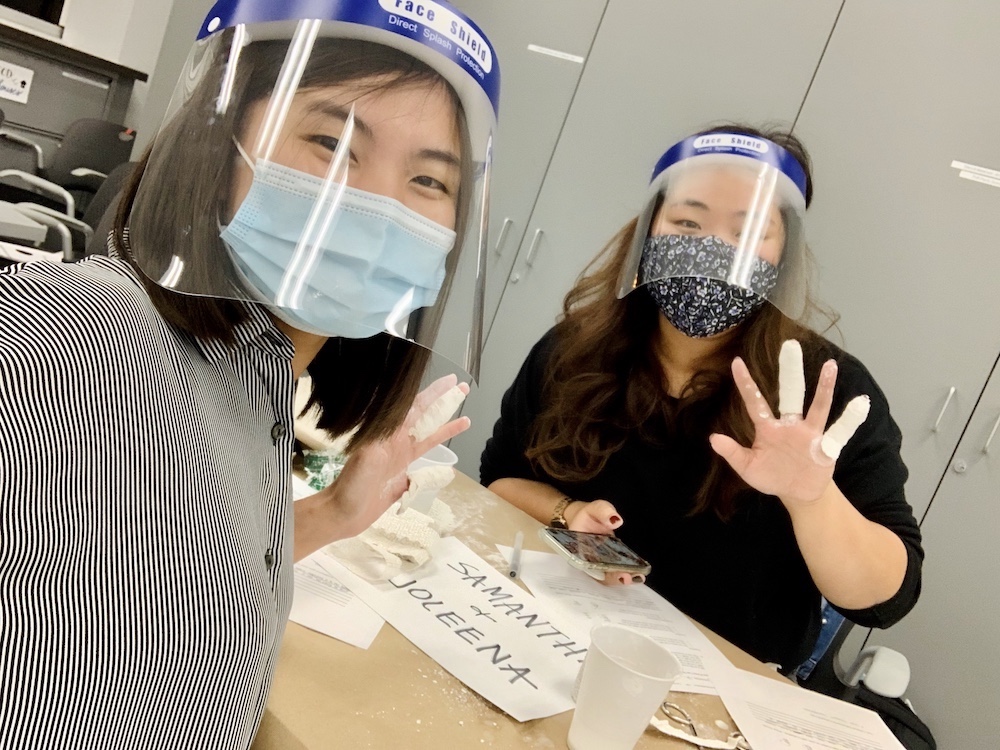
Me and my partner Sammy during digital casting lab class
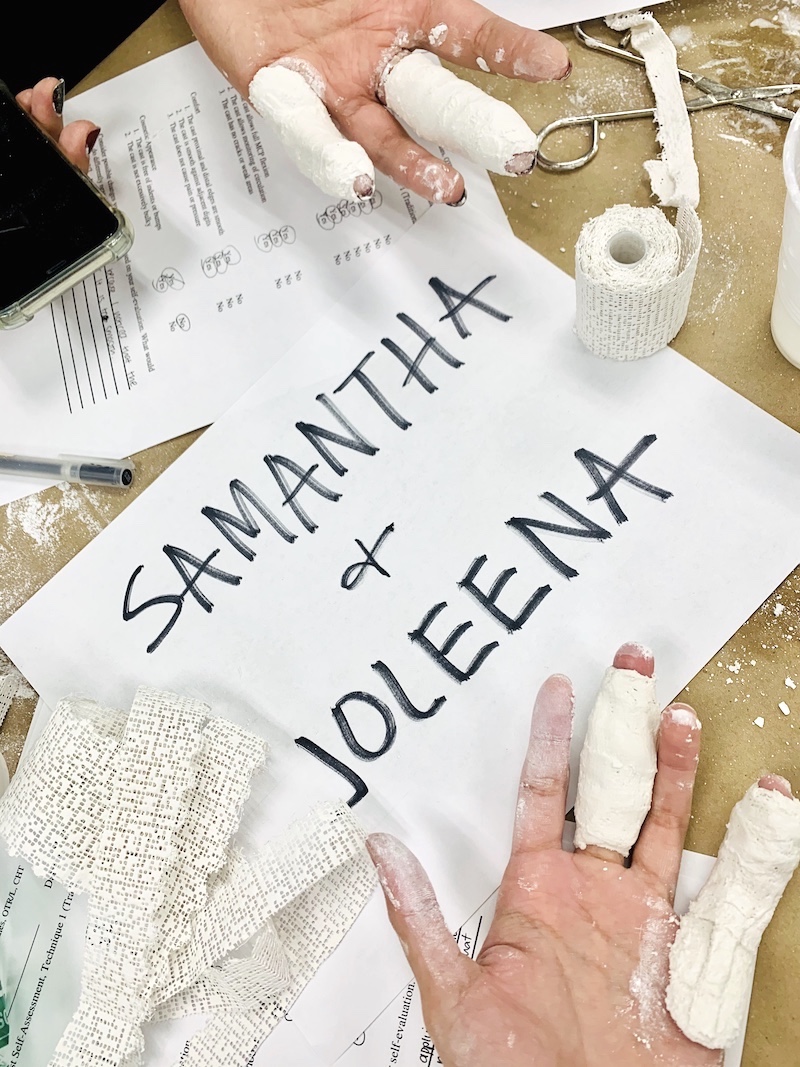
Showing off the digital casts we fabricated for each other
I definitely learned a lot from this course but one major takeaway that I will never forget is Lisa Deshaies’ (our professor) motto which she likes to abbreviate as FOFO, which stands for “Fight On For Occupations.”
OT 562: Advanced Hand Rehabilitation and Certification (Physical Agent Modalities)
A co-requisite of this course is the OT573 Hand Rehabilitation elective I just discussed above. Now that I have the knowledge that I need about hands and the upper extremity, I decided to further my knowledge on the application of Physical Agent Modalities (PAMs) as a preparatory activity for occupation. Each week, we examined a different modality (i.e., heat, ultrasound, TENS, etc.), discussing each of the modality’s purpose, methods, precautions, contraindications, and application in practice. I gained a lot of insights from my classmates during small group discussions. After taking this class, I feel more adept in writing SOAP notes and engaging in evidence-based practice. Another reason why I chose this elective is because the hours that I earned in class are applicable towards the California Board of OT educational requirements for advanced practice. Our professors, Janice Rocker and André Woo prepared us well for this application by training us all on how to properly fill out the advanced practice application form to make sure that we are ready when the time comes.
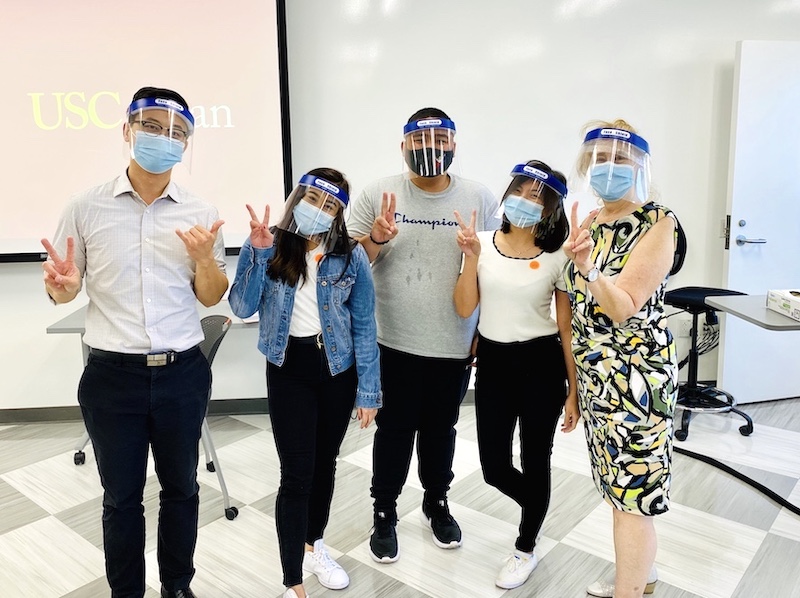
Me with my classmates Erika and Elmo and our professors Janice (rightmost) and Andre (leftmost)
OT cinco seis seis (OT 566): Healthcare Communication with Spanish-Speaking Clients
Besides already having a little bit of background in speaking Spanish, I took this course with the goal of being able to communicate effectively with Spanish speaking clients I may have in the future. Although I may not be able to speak it really fluently yet, I believe the mere fact that you’re making an effort makes a difference in creating a safe space for them, consequently helping in the establishment of client-therapist rapport. The focus of the course is learning Spanish words and phrases within a therapeutic context, so I learned how to speak basic sentences that we usually say during therapy sessions such as when introducing yourself: “Mi nombre es Yna y yo soy su terapeuta ocupacional.” Our professor, Dr. Delgado, provided us with various avenues to practice our skills through group work, practicum, assignments—including one wherein we have to use an app that tracks our progress weekly.
⋯





